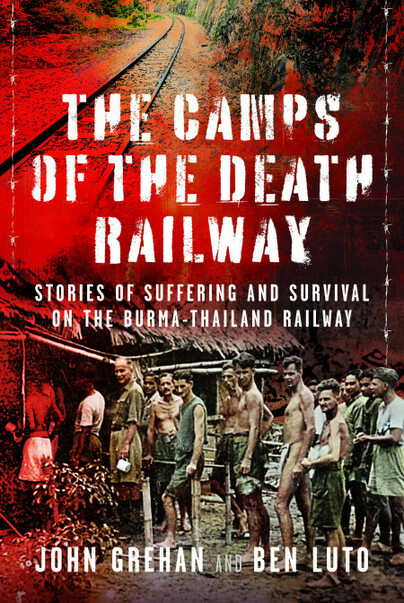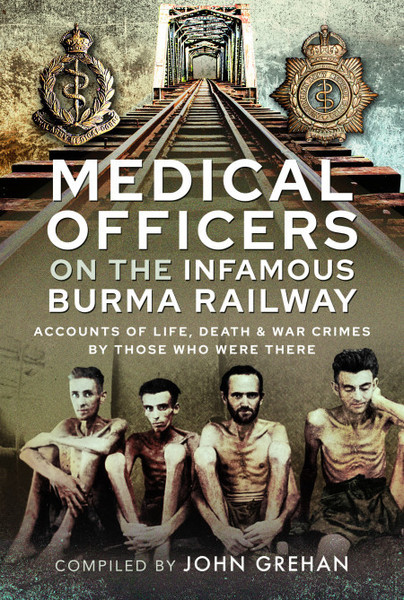The Camps of the Death Railway (Hardback)
Stories of Suffering and Survival on the Burma-Thailand Railway

Pages: 344
Illustrations: 32 black and white illustrations
ISBN: 9781526724762
Published: 30th June 2025
(click here for international delivery rates)
Need a currency converter? Check XE.com for live rates
As the terrible conditions experienced by the British, Australian, Dutch, and American PoWs in the building of railway linking Buma and Thailand became known, as well as the appalling atrocities the men suffered at the hands of the Japanese, it was clear that an investigation would have to be undertaken. Before war trials began, the Japanese submitted their account of the building of the railway, which is presented here. What is also presented are the stories from the prisoners themselves from each of the camps, telling in stark, unflinching detail what really happened to them.
Drawn entirely from first-hand accounts, a picture emerges of men being driven to very heavy manual labour without boots to protect their feet from injuries which resulted in tropical ulcers and the amputation of untreatable limbs with nothing but a wood saw. Of men dying of cholera in their hundreds; of stinking, maggot-ridden open latrines and campgrounds covered in faeces from dysentery sufferers.
With virtually no medical equipment or medicines, the Allied medical officers faced an unwinnable battle to save the lives of men so weakened from hunger and unremitting work at times for eighteen hours a day, they could not fight off the multiple diseases which were endemic in the depths of the Thai and Burmese jungles.
As more and more prisoners became ill, the number available for work on the railway diminished. But with orders to finish the railway ahead of time, the Japanese forced prisoners from their hospital beds out to work, many of whom never returned.
When Allied officers tried to intervene to protect their men, they were subjected beating from the Japanese and Korean guards. Other brutal punishments, sometimes fatal, were handed out to the prisoners, frequently for no accountable reason. Conditions were so intolerable, some prisoners tried to escape, only to die in the jungle or be recaptured and executed. Others simply gave up all hope and died, quite literally, of despair.
There were, of course, lighter moments amid the misery. Elephants were used to pull heavy logs. When an extra load was added to that of one elephant, the animal refused to move. As the normal method adopted by the Japanese with uncooperative prisoners was to give them a beating, one of the guards hit the elephant. The elephant roared and charged after him, chasing the terrified guard into the River Kwai and squirted water at him through his trunk.
Through sheer determination in some cases or mere good fortune, many men survived the horrors of the camps to tell the world of what was one of the most dreadful humanitarian disasters of the Second World War. This is their story.
There are no reviews for this book. Register or Login now and you can be the first to post a review!
About John Grehan
JOHN GREHAN has written, edited or contributed to more than 300 books and magazine articles covering a wide span of military history from the Iron Age to the recent conflict in Afghanistan. John has also appeared on local and national radio and television to advise on military history topics. He was employed as the Assistant Editor of Britain at War Magazine from its inception until 2014. John now devotes his time to writing and editing books.
About Ben Luto
BENJAMIN LUTO’s passion for history was inspired by his father, James Luto, whose interest in militaria and the Second World War, in particular Burma and the SEATIC theatre, has continued to this day. This drove Ben to complete a degree in history at university. Alongside the Roman Empire, the events of the Napoleonic Wars, the Second World War and the history of espionage rank among his favourite topics. Having also completed a Masters in Intelligence and Security Studies, Ben moved to Rochester, Kent, from where he commutes to London for his work in Cyber Security Consulting.
In 1944, a compilation of medical reports from the main prisoner of war work camps along the infamous Thailand-Burma railway was submitted to General Arimura Tsunemichi, commander of the Japanese Prisoner of War Administration. The authors stated that the reports were neither complaints nor protests, but merely statements of fact. The prisoners received only one reply – that all copies of the documents must be destroyed. As one officer later recalled, ‘Of course, this was not done’ and copies of these reports survived, stored away in dusty files, for future generations to learn the truth.…
By John GrehanClick here to buy both titles for £38.99





















